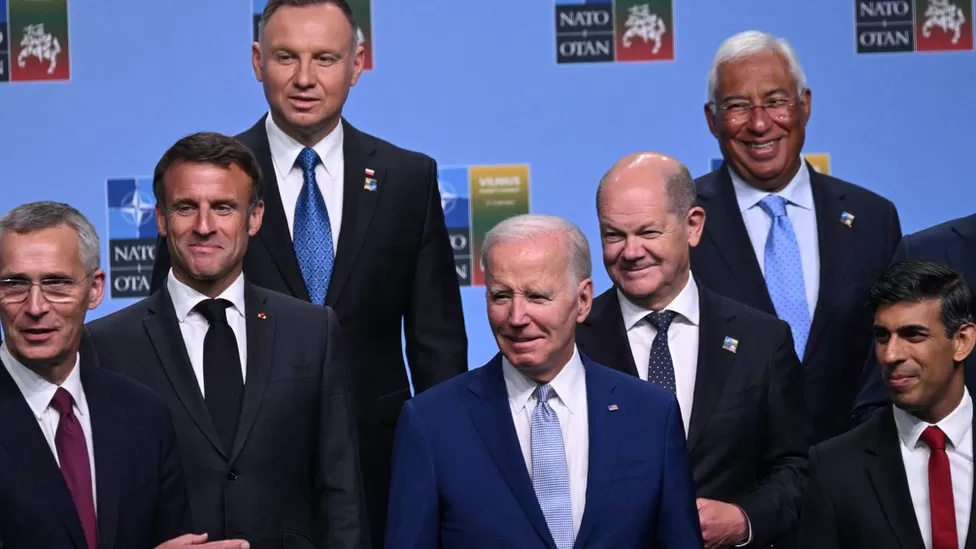During the NATO summit on Wednesday, G7 members are expected to ratify a long-term security arrangement with Ukraine. The agreement will involve defense equipment, training, and intelligence sharing to support Ukraine’s security. British Prime Minister Rishi Sunak stated that this agreement would send a strong signal to Russian President Putin. The move comes after Ukrainian President Zelensky criticized NATO for not providing a clear timeline for Ukraine’s accession to the alliance.
Prime Minister Sunak emphasized that the international community must prevent a repetition of the conflict in Ukraine and reaffirmed its commitment to protect Ukraine from future aggression. The agreement aims to support Ukraine’s pathway to NATO membership and establish formal arrangements among NATO members to ensure Ukraine’s long-term security.
The United Kingdom led in this agreement, working with G7 partners, including Canada, France, Germany, Italy, Japan, and the United States. Further details about the agreement are expected to be revealed on Wednesday.
US President Joe Biden suggested a model similar to the US-Israel agreement, which involves providing substantial military aid over a decade. However, this agreement does not include a mutual defense clause, unlike NATO membership.
The G7 announcement follows NATO’s statement that Ukraine can join the alliance when conditions are met, and allies agree. President Zelensky criticized the delay as “absurd” and stressed Ukraine’s desire to join NATO as soon as possible after the conflict with Russia ends.
Speaking in Lithuania, President Zelensky stated that NATO would provide security for Ukraine, which, in turn, would strengthen the alliance. He presented a battle flag from Bakhmut, which witnessed one of the longest and bloodiest battles in Russia’s invasion of Ukraine.
President Zelensky expressed concerns about the lack of a clear timeframe, noting that the absence of an agreed-upon timeline could turn Ukraine’s eventual membership into a bargaining chip.
Although NATO did not provide a specific timeline for Ukraine’s accession to the alliance, diplomats emphasized that they had established a clear path to membership. The application process has been significantly shortened, and NATO recognized Ukraine’s army as increasingly interoperable and politically integrated with NATO forces. The alliance pledged to support reforms in Ukraine’s democracy and security sector. Furthermore, a new NATO-Ukraine Council has been established, granting Ukraine the right to convene meetings of the entire alliance.

However, the absence of a timeline is viewed as a setback for Ukraine, as some member states are concerned that near-automatic membership could incentivize Russia to escalate and prolong the conflict. The focus now shifts to the long-term security guarantees that NATO members will offer Ukraine as an alternative to immediate membership. NATO hopes that robust and explicit security commitments will dissuade further aggression from Russia.
During the Vilnius summit, Turkey lifted its opposition to Sweden joining NATO, allowing it to become its 32nd member. Sweden’s application had been previously blocked by Turkey, accusing it of hosting Kurdish militants. Sweden and Finland, which shares a border with Russia, announced their intention to join NATO following Russia’s invasion of Ukraine.
At the summit, a series of military packages for Ukraine were announced. A coalition of 11 nations will commence training Ukrainian pilots to fly US-made F-16 fighter jets at a center to be established in Romania. The US has also approved for its Western allies to supply advanced jets to Ukraine, including the long-awaited F-16s. Additionally, the UK has plans to deliver over 70 combat and logistics vehicles to boost Ukraine’s counteroffensive operation.
Meanwhile, according to Ukraine’s military, Russia launched kamikaze drone attacks on Kyiv and its region for the second consecutive night. Initial reports indicate no immediate casualties or major destruction.
Also Read:
Iowa Republicans Approve a Fresh 6-Week Abortion Ban
Whistleblower Charged: Accusing Bidens, Arms Trafficking, Iran Sanctions

